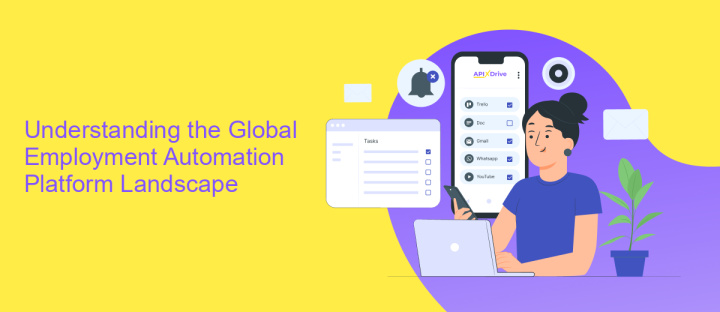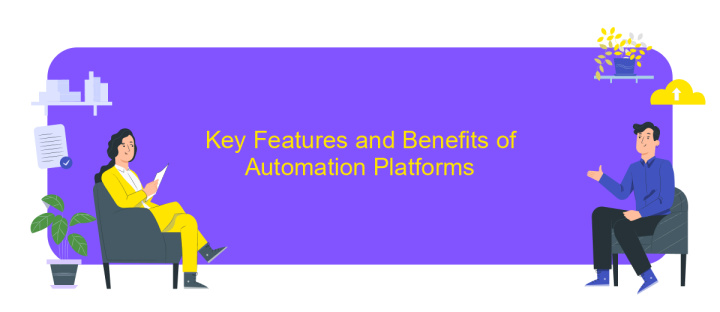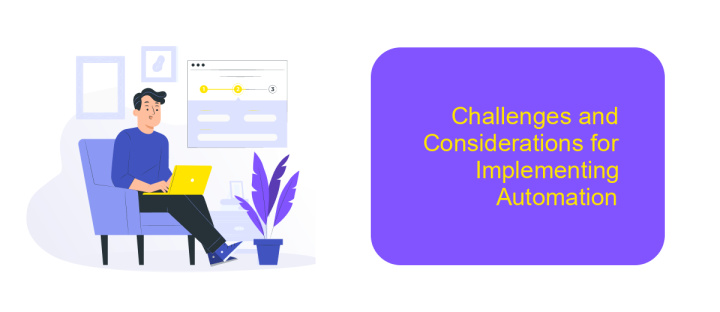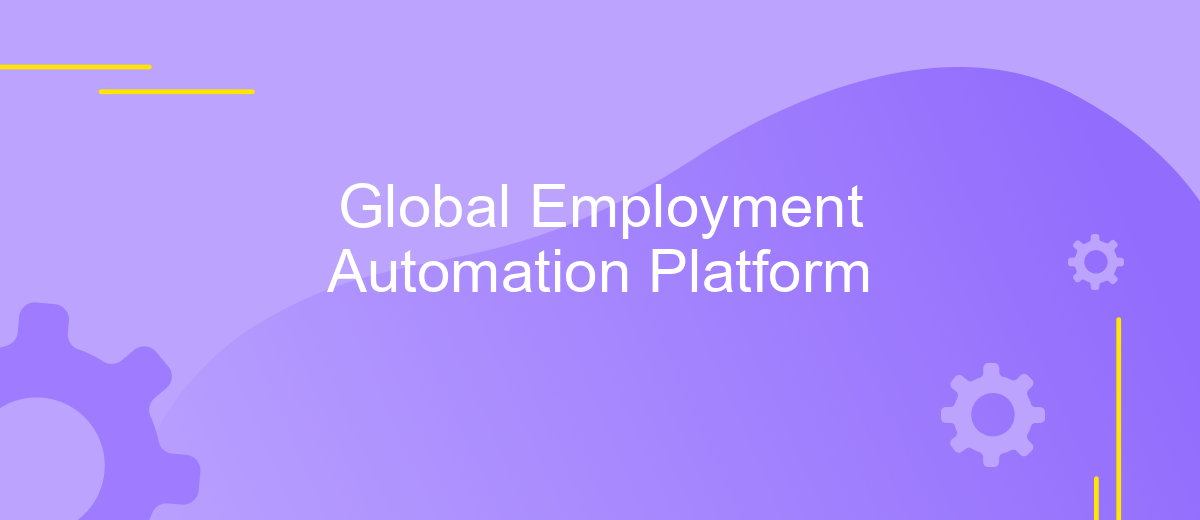Global Employment Automation Platform
In today's rapidly evolving digital landscape, the Global Employment Automation Platform emerges as a transformative force reshaping the future of work. By seamlessly integrating cutting-edge technologies with workforce management, this platform empowers businesses to streamline operations, enhance productivity, and adapt to the dynamic global market. As automation redefines traditional employment paradigms, understanding its impact becomes crucial for organizations striving to thrive in this new era.
Introduction: The Rise of Automation in Global Employment
Automation is transforming the landscape of global employment, reshaping how businesses operate and how tasks are performed. As technology advances, companies are increasingly adopting automated solutions to enhance efficiency, reduce costs, and improve accuracy. This shift is not only altering traditional job roles but also creating new opportunities in various sectors. From manufacturing to services, automation is becoming a critical component in driving productivity and economic growth.
- Increased efficiency and productivity
- Reduction in operational costs
- Improved accuracy and quality of work
- Creation of new job roles and opportunities
- Challenges in workforce adaptation and skill development
While the rise of automation offers numerous advantages, it also presents challenges that need to be addressed. The workforce must adapt to new technologies, requiring reskilling and upskilling to meet changing demands. Policymakers and educators must collaborate to ensure that workers are prepared for the evolving job market. As automation continues to advance, its impact on global employment will be profound, necessitating strategic approaches to harness its potential while mitigating associated risks.
Understanding the Global Employment Automation Platform Landscape

The global employment automation platform landscape is rapidly evolving, driven by technological advancements and the need for efficient workforce management. These platforms are designed to streamline HR processes, from recruitment to payroll, using automation to reduce manual tasks and increase accuracy. Companies are increasingly adopting these solutions to remain competitive and agile in a global market. The integration of artificial intelligence and machine learning further enhances these platforms, allowing for predictive analytics and more personalized employee experiences.
Integration capabilities are a critical component of these platforms, enabling seamless communication between different systems and tools. Services like ApiX-Drive facilitate this by offering easy-to-use integration solutions that connect various applications without the need for extensive coding knowledge. This not only simplifies the automation process but also ensures that data flows smoothly across different departments, enhancing overall operational efficiency. As businesses continue to embrace digital transformation, the role of employment automation platforms in optimizing workforce management becomes increasingly vital.
Key Features and Benefits of Automation Platforms

Automation platforms are revolutionizing the global employment landscape by streamlining processes and enhancing productivity. These platforms offer a comprehensive suite of tools designed to automate repetitive tasks, thereby freeing up valuable human resources for more strategic initiatives. By integrating seamlessly with existing systems, they ensure a smooth transition to automated workflows, minimizing disruptions and maximizing efficiency.
- Task Automation: Automate routine tasks such as data entry, scheduling, and reporting, reducing human error and saving time.
- Scalability: Easily scale operations to meet growing business demands without a proportional increase in workforce.
- Analytics and Insights: Gain real-time insights into operational performance, allowing for data-driven decision-making.
- Cost Efficiency: Reduce operational costs by minimizing manual labor and optimizing resource utilization.
- Integration Capabilities: Seamlessly integrate with existing software and tools, ensuring continuity and enhancing functionality.
Embracing automation platforms not only optimizes operational efficiency but also empowers organizations to stay competitive in a rapidly evolving market. By leveraging the key features and benefits of these platforms, businesses can achieve greater agility, improved accuracy, and substantial cost savings, ultimately driving growth and innovation.
Challenges and Considerations for Implementing Automation

Implementing automation in a global employment platform presents several challenges that organizations must carefully navigate. One of the primary concerns is the integration of automation technologies with existing systems, which often requires significant time and resources. Additionally, the variability in regulations across different countries can complicate the implementation process.
Another critical consideration is the impact on the workforce. While automation can streamline operations, it may also lead to job displacement, requiring companies to invest in retraining programs to support affected employees. Balancing cost-efficiency and ethical responsibility is essential for sustainable automation.
- Ensuring data security and privacy in automated processes
- Managing cultural differences and language barriers
- Aligning automation goals with business objectives
- Maintaining transparency and accountability in decision-making
Finally, organizations must foster a culture of innovation and adaptability to fully leverage automation benefits. This involves continuous monitoring and evaluation of automated systems to ensure they meet evolving business needs. By addressing these challenges thoughtfully, companies can harness automation to enhance productivity and global competitiveness.
- Automate the work of an online store or landing
- Empower through integration
- Don't spend money on programmers and integrators
- Save time by automating routine tasks
The Future of Work: Global Employment in the Age of Automation
As automation technologies continue to evolve, the global employment landscape is undergoing significant transformation. The integration of advanced AI and robotics is reshaping traditional roles and creating new opportunities across various sectors. Companies are increasingly adopting automation to enhance efficiency and reduce operational costs, leading to a shift in the types of skills required from the workforce. While this evolution presents challenges, such as job displacement, it also opens avenues for innovation and growth. Workers are encouraged to adapt by acquiring new skills that complement automated processes, ensuring their relevance in the modern workplace.
In this new era, platforms like ApiX-Drive play a crucial role by facilitating seamless integration between various business applications. These services empower organizations to automate workflows without the need for complex coding, thereby streamlining operations and enhancing productivity. By leveraging such tools, businesses can focus on strategic tasks, fostering an environment where human creativity and machine efficiency coexist harmoniously. The future of work will be characterized by a dynamic interplay between human talent and automated systems, driving global employment towards a more interconnected and efficient paradigm.
FAQ
What is a Global Employment Automation Platform?
How does a Global Employment Automation Platform benefit companies?
Can a Global Employment Automation Platform integrate with existing HR systems?
What are the key features to look for in a Global Employment Automation Platform?
How does a Global Employment Automation Platform ensure compliance with local labor laws?
Time is the most valuable resource in today's business realities. By eliminating the routine from work processes, you will get more opportunities to implement the most daring plans and ideas. Choose – you can continue to waste time, money and nerves on inefficient solutions, or you can use ApiX-Drive, automating work processes and achieving results with minimal investment of money, effort and human resources.


